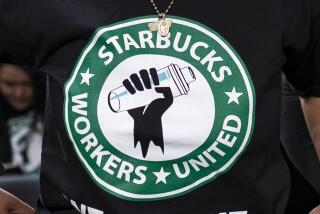Gap Seeks Better Conditions at Global Garment Factories
- Share via
Gap Inc. reported Wednesday that many overseas workers making the retailer’s clothes are mistreated and vowed to improve conditions by cracking down on unrepentant manufacturers.
The San Francisco-based owner of the Gap, Old Navy and Banana Republic stores made the comments in its first ever “social responsibility” report -- a 40-page document that mixed contrition about the past with promises to do better in the future.
“We feel strongly that commerce and social responsibility don’t have to be at odds,” Gap Chief Executive Paul Pressler told a small gathering of shareholders Wednesday at the company’s annual meeting.
Gap’s report comes after nearly a decade of wrangling with labor rights groups and other organizations over the company’s alleged mistreatment of workers around the world. Although labor activists praised the company for making its findings public, others noted that Gap’s efforts come much later than -- and, in some cases, fall short of -- other apparel companies such as Reebok International Ltd.
“It’s positive that they’re coming out with a report that moves this issue of social responsibility forward, but the reality is that the Gap produces in countries where workers don’t have basic rights and they leave countries where workers do have basic rights,” said Medea Benjamin, the founding director of Global Exchange, a San Francisco-based human rights organization that organized protests and boycotts of Gap in the 1990s over what it said was Gap’s use of “sweatshop” labor. “They’re coming late to it, definitely, and they came kicking and screaming.”
Wal-Mart Stores Inc., the world’s biggest company and a frequent target of sweatshop critics, plans to review Gap’s report to get ideas on how it might improve conditions at the factories supplying its merchandise, spokesman Bill Wertz said.
In its report, Gap said it uncovered thousands of violations at 3,009 factories scattered across about 50 countries. “Few factories, if any, are in full compliance all of the time,” the report said.
Gap’s report provides a geographic breakdown on the workplace violations uncovered by a team of more than 90 inspectors.
The most frequent problems cropped up in China, a country that is expected to play an increasingly prominent role in the world economy. Of the 241 China factories rated by Gap last year, 73 plants received the company’s two lowest grades -- “needs improvement” or “immediate attention required.”
The listed troubles covered in the Gap report included psychological or verbal abuse -- something that Gap said occurred at 10% to 25% of the China factories that supply the company.
Unacceptably low pay is an especially widespread problem throughout the world, according to Gap’s statistics. The issue is becoming an increasingly thorny topic, with U.S. labor and political leaders arguing that the country is losing thousands of jobs as companies export work to take advantage of cheaper wages in other parts of the world.
Gap said it ordered manufacturers to address violations, including substandard pay, when the problems were discovered.
If a factory repeatedly violates the rules, Gap dumps the offending manufacturer, it said. Gap cut ties with 136 factories last year, including 84 in China and Southeast Asia. The company pledged to become even more vigilant in its resolve to improve factory conditions.
Gap shares rose 15 cents to $22.43 on the New York Stock Exchange.
Associated Press and Times staff writer Abigail Goldman contributed to this report.
More to Read
Inside the business of entertainment
The Wide Shot brings you news, analysis and insights on everything from streaming wars to production — and what it all means for the future.
You may occasionally receive promotional content from the Los Angeles Times.










